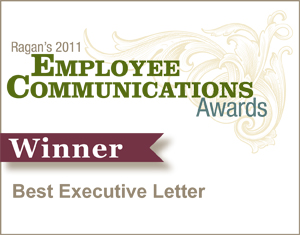Newly appointed LCRA General Manager sends letter to employees
The winning letter helped GM Becky Motal define her role and goals for the company.
The imperatives for a superior executive letter:
- Have something definite and practical to say. Be sure to call for a real business action by employees as soon as possible. The corollary: Never write an executive letter simply because you have to fill space in the monthly employee magazine.
- Use clear, simple language. Avoid the clichés of biz talk. Eliminate jargon. Kill buzz phrases. Be sparing in your use of abstract nouns, adjectives, and verbs; keep abstraction to a minimum. Above all, delete “soft jargon,” plausible words that impersonate definite language but hide the lack of hard, detailed thought behind what is said.
- Tell employees what you, the CEO or general manager, are going to do. Tell them what you’re going to ask your leadership team and senior managers to do. Be specific, practical, vivid. Supply definite details for the short-run goals and the long term.
- Give employees a compelling reason for doing what you want them to do, and for what you and your execs are going to do. Illustrate this urgency with plenty of practical detail. Paint a lively picture of the difficulties you face.
- Avoid pussyfooting around hard, uncomfortable issues. Identify the one or two most important issues. Tell employees what you plan to do about them.
- Be as complete as you can. Announce plans for new teams, new appointments, new organization structures in as few plain, simple sentences as you can.
- Never waste your employees’ time by asking them to read platitudinous generalities that no one would care to contradict. Eliminate mere verbiage ruthlessly!
The winner of the 20ll Ragan’s Employee Communications Award for the Best Executive Letter (Electronic Publication), the Lower Colorado River Authority (LCRA), exemplifies these criteria admirably. Written by newly hired General Manager Becky Motal, Communications Manager Jerry White, and Communications Services staffer Victor Tran, this executive letter stands out by virtue of its terseness, its immediate practicability, its candor, and its amount of useful information conveyed per word, phrase, and sentence.
It is an important, even crucial business document. It’s astonishing how many CEOs and publication editors forget that indispensable function of an executive letter. You’ve got to have something important and definite to say first, last, and always. If you don’t have that, you’re wasting everybody’s time.
Motal and her team wasted no time at all with this letter. And that’s why it won.
To view the winning work please click here.
View More Employee Communications Awards 2011 Winners.
Visit Ragan.com/Awards to learn more about awards opportunities.


